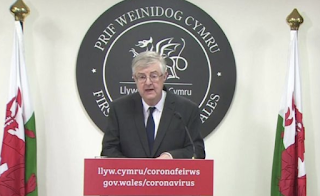With everyone eager to keep up to date, coronavirus has been the main - almost only - subject for the media. Good news for the broadcasters and the press, you would think.
While it has been a boost for television that has adapted well for its huge audience, millions trapped at home, it is a different story for the press.
National, regional and local weekly newspapers are finding it hard going. Some are struggling to survive. Lockdown has drastically hit newsagents sales, street sellers disappeared - remember their calls? - 'Late night final'!
All our papers have been hit, national, regional and weekly.
Today's crisis follows many years of steady decline, from the heady days when Britain led the world in newspaper readership - ninety percent of the population. The Daily Mail and Daily Express sold two million copies a day.
Radio and, from the early nineteen fifties, television, started the newspaper rot. In just ten years from 1960 eight national newspapers folded.
 |
| The Echo 1978 |
 |
| The Echo, 2020 |
In my early days, the Penarth Times on which I started, was owned by a Penarth family, the Pickfords, whose editor, Herbert, was a member of almost every organisation in the town. George Hoare, the editor of the Argus who hired me in 1948 was a magistrate and key figure in the town. They knew their patch and their community and it showed in the paper, and their circulations.
That local touch has long gone. The group owning the The Argus is a typical example of the problem. After being given a very substantial Welsh government grant to set up a sub-editing hub for its range of papers and create ten new jobs it has closed it and switched to Dorset.
As one of the Welsh editors said this week, 'Local papers are an essential part of our communities. It is a tragedy to see them closing.'
As a dyed in the wool, old fashioned reporter - hack - I agree.




















